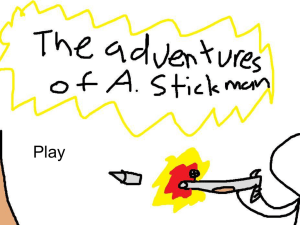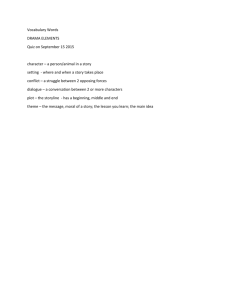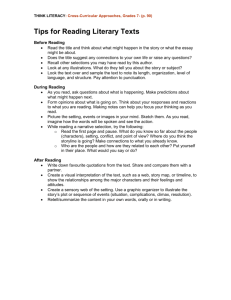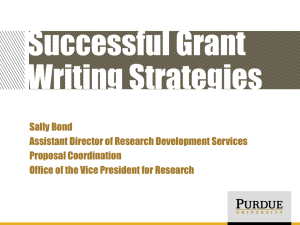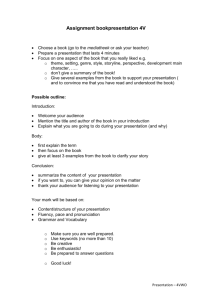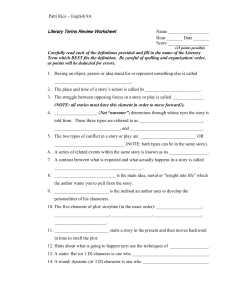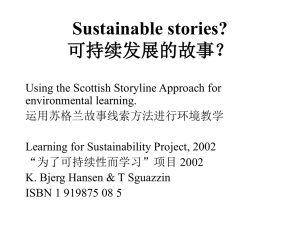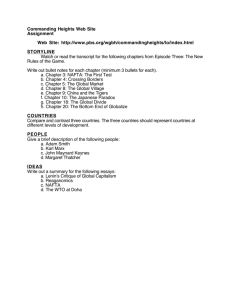An Introduction to Storyline Yvonne McBlain – Effective Learning Support Teacher
advertisement
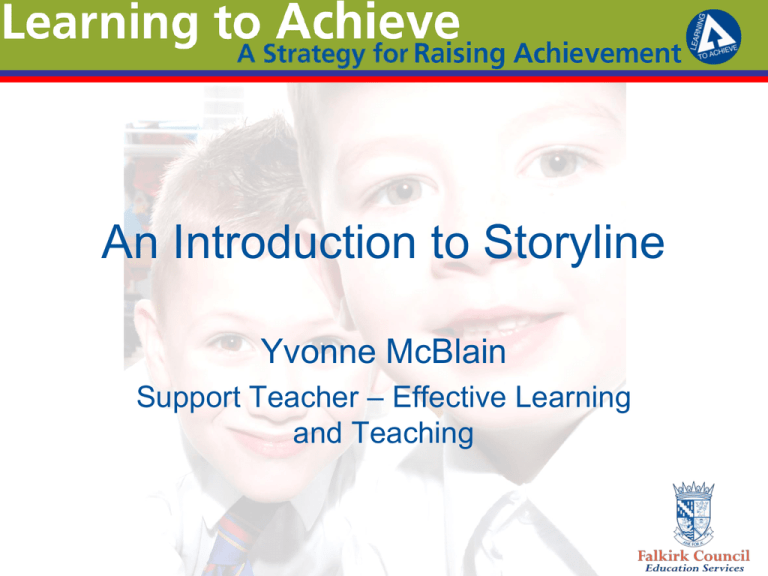
An Introduction to Storyline Yvonne McBlain Support Teacher – Effective Learning and Teaching Format : • • • • • • Welcome Brief presentation Practical experience of storyline – wee taster Tour of Storyline Glow group Study of Storyline plans Evaluation What is Storyline? • Uses a story to frame context-based teaching • A framework for interdisciplinary learning • Partnership between teacher/pupil – teacher controls the line • Pupil ownership of elements ensures their engagement Brief History • 1960s new educational research/reports recommended more integration within the curriculum. • Introduction of Environmental Studies and Aesthetic Subjects. • 1967 In-service Tutor Team formed at Jordanhill College of Education investigate/ experiment with Topic Studies as a form of integration. • Storyline evolved from topic studies & grew in popularity over next two decades . STORYLINE SCOTLAND Sallie Harkness Steve Bell – Educational Consultant www.storyline-scotland.com “A strategy for teaching in an enterprising and creative way” THE EPISODES 1) 2) 3) 4) 5) 6) The Setting The Characters An Initiating Event Incidents Culminating Event A Review Process STORYLINE PLANNING FORMAT The Storyline Episodes 1. The Setting 2. The Characters 3.Initiating Event 4. Incidents 5. Culminating Event 6. Review Key Questions Pupil Activity Class Organisation Resources Required Outcome Key Questions are vital • Are phrased in language suitable for learners • Contain the required learning • Allow the teacher to control the learning or “line” contained within the story • Lead to activities which develop skills and/or knowledge • Can come from pupils too of course! Let’s Have a Go! What do you notice about storyline? • Which curricular areas could this storyline target? • Which skills within these areas can your activities target? • How much control do you need to retain? What benefits are there to supplying information? What drawbacks can you see – is it better to allow more pupil choice? Curriculum for Excellence – Why Storyline? In what ways could storyline methodology help you implement Curriculum for Excellence? Curriculum for Excellence – Why Storyline? • Integrates creativity & independent learning – development of pupil critical & creative thinking for future economic/national success. • Interdisciplinary opportunities allows stream-lining desired by the new curriculum. • Possible impact of increased pupil engagement on attainment. • Offers a framework for the principles of Curriculum Design (Building the Curriculum 3). • Match between educational philosophy & methodology desired by CfE. Links with Learning to Achieve? • • • • Principles of curriculum design Learning and Teaching Curriculum Outcomes Learning Entitlements • Other sections depending on implementation Storyline – Latest Developments • World War II, Scottish Wars of Independence, When Gran was a Girl, Romans @ first level & Toys @ early social studies pilot project materials being finalised and added to storyline GLOW group documents • GLOW group collection of storyline materials in the documents section to provide and support teachers – please contribute if you can! • Many schools now delivering one topic per session using storyline in preparation year for Curriculum for Excellence • CPD each session will include an opportunity for the evaluation and planning of teacher-created storylines as well as introductory sessions Storyline – How should I use it? • Try an existing plan initially to gain confidence and experience • Ensure your storyline devices are suitable for your pupils – if unsure get advice from SMT • One storyline per class per session is enough • As you gain experience adapt your storylines to allow pupils to lead as much as possible • Enter into the spirit of storyline and make it enjoyable for your pupils – and you! What storyline support is there? • Tour of Storyline Glow group • Study of existing plans & materials – group discussion • yvonne.mcblain@falkirk.gov.uk • 01324 501985 Evaluation • Review of learning intentions • Completion of evaluation forms
